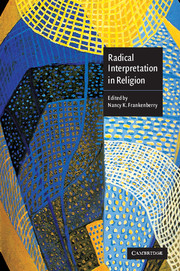Book contents
8 - You don't read a myth for information
Published online by Cambridge University Press: 13 November 2009
Summary
At first glance the study of religion appears to be a many-splintered thing. In fact, a growing number of scholars think that there is no such subject matter, that religion, or, more specifically, Hinduism, for example, is a figment of scholars' imaginations. However, one has only to survey the last two-hundred years of scholarly writings about religion in order to discover a very interesting fact: the study of religion is anything but splintered; on the contrary, I find there is massive agreement on its essential meaning. The familiar disagreements usually express only different variations, not the fundamentals, of the prevailing agreement. My purpose in this chapter is to expose some of the pitfalls that attend that agreement.
In general, two primary theories of religion have competed with each other in the modern study of religion: the rational–intellectualist theory and the expressive–symbolist theory. The first holds that religion, consisting of beliefs, myths, and rituals, is rational and false. E. B. Tylor's Primitive Culture (1871) and Emile Durkheim's The Elementary Forms of Religious Life (1912) are two classical examples. It is not a popular theory at the present time. It requires that religious beliefs be taken literally and most rituals viewed as rational, means–ends actions. In brief, this theory explains religion as entailing propositional attitudes whose significance is not unique, special, or distinct from ordinary, natural language, thought, and action. This last assumption cannot be overemphasized in the interpretation I want to advance.
- Type
- Chapter
- Information
- Radical Interpretation in Religion , pp. 153 - 170Publisher: Cambridge University PressPrint publication year: 2002
- 12
- Cited by



